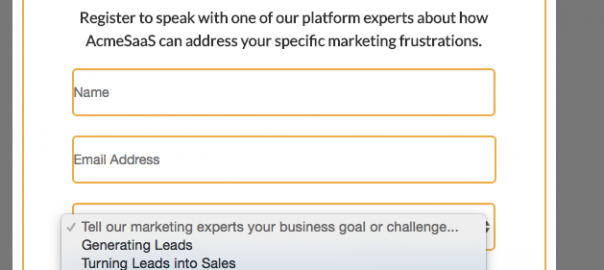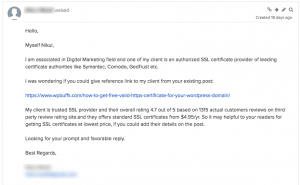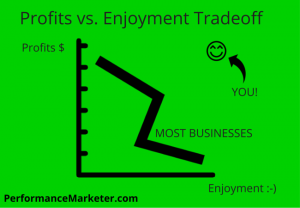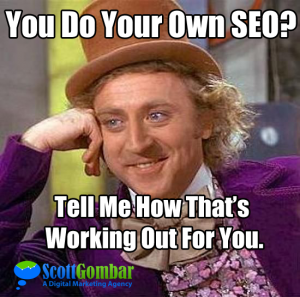
What are you doing with your leads once you get them?
Are you turning them into customers?
Hopefully the answer to that is “We’re trying our hardest!”
No matter if you’re sending your leads to a CRM or leads database or straight to a sales associate, the information you have on that new lead is what decides whether or not they become a sale.
This article will give you the most important pieces of lead information to ask your visitors. This information is crucial in nurturing leads and driving them towards an end conversion or sale.
Without further ado, let’s get rolling!
Lead Information #1: Email Address

Why to Ask for this Lead Information:
Without an email address, you don’t, technically, have a true lead. Your ability to communicate with that individual is severely limited.
It’s not, of course, completely gone. Many good marketing automation platforms will allow you to dynamically edit your site or show popups/overlays to people based on their visit behavior.
But who are we kidding, unless you ask for an email address you have no way of emailing your leads. That means no drip campaign, no possible contact from sales, no Facebook Ad custom audience targeting, nothing.
So yeah, it’s important…
What to Do With This Lead Information:
- Send your new leads a welcome email to thank them for converting and introducing yourself. Be sure this is a personalized email, as the first thing you need to do is break the “faceless corporation” mold.
- Segment your leads based on the page they converted on. This is the best way for you to (before asking any further questions) get a handle on what they might be interested in. And “interested in” is an incredibly valuable piece of information, as it frames the content you use to nurture them towards a sale or the way in which you communicate.
Lead Information #2: Name

Why to Ask for this Lead Information:
It’s not, necessarily, to personalize your emails.
Let me make that clear, as it’s worth remembering.
In the past few years, email marketers have gone back and forth on this. Personally, I don’t think it’s worth it to try.
Many people, when they first become a lead (particularly if we’re talking about converting on gated content don’t give you their name as it’s actually used. The email address may be accurate, but I often use “james” or even “asdf” when converting on a lead magnet.
And the last thing you want is to be “personalizing” your emails with “Hi there asdf!, Welcome to Wishpond!”
Another aspect of this is that no two marketers agree on whether it’s better to use first names anyway. Researchers at Temple’s Fox School of Business ran a study with 600,000 email recipients and “found that consumers’ responses to personalized greetings ranged from very negative to, at best, neutral.”
They went on to give their reasoning (which makes complete sense to me)…
“Given the high level of cyber security concerns about phishing, identity theft, and credit card fraud, many consumers would be wary of emails, particularly those with personal greetings.”
Asking for a name from your leads is very useful in sales conversations and manual emails, but not automated ones. But make sure people know damn well they’re not receiving an automated email, otherwise you might lose out.
What to Do With This Lead Information:
- When a sales associate knows a lead’s name, they can ask for them on the phone or find an email address (if they know the company name as well).
- Test it in the address of your emails. Just because some businesses have found it to yield a negligible (or even negative) response, A/B testing your email marketing campaigns is still essential. Personally, Wishpond’s tests on this are still inconclusive.
Lead Information #3: Job Title

Why to Ask for this Lead Information:
Job title is an excellent way to segment your leads. Are they a decision-maker? Do they control budget? Or are they a content creating intern who just wanted the stats from your industry report?
Getting job title lead information shouldn’t be very difficult either. Just add a dropdown of likely job titles (CEO, CMO, Account Manager, Sales, Marketing Team, etc) to give you a clearer idea of who your new lead is and how you should best communicate with them.
What to Do With It:
- Send high-value leads straight to sales: If you have “CEO” or “CMO” as a job title option, you may choose to send those leads directly to sales for a genuinely personal email. Though you don’t want to lose a single lead, the whole concept of segmentation is about understanding the value of your leads.
Lead Information #4: Company Name

Why to Ask for this Lead Information: Company name (or website, if you prefer) is one of the best pieces of lead information to use within lead nurturing campaigns.
Company name makes communication personal and hyper-relevant – even more so than first name.
First name means you’re talking about the person – but you don’t know who they are or what they want. You just know their name.
Company name means you’re talking to a company. It means you’ve looked them up and know about what they do, who they are and can guess at the challenges they face.
It’s clearer if you see an example of “company name” in a lead nurturing email…
What to Do With It:
So how about I just show you?
Hi {{first_name}},
I’ve heard from many other gym owners that they struggle to convert website visitors into email subscribers.
Is this an issue at {{company_name}}?
Before AcmeFitness used Wishpond’s pop-up tool, they were only getting email signups through an online form. With triggered pop-ups, AcmeFitness collected more than 1,066 emails they would have otherwise lost.
I have a few tips on how you can use pop-ups and web forms to do giveaways, prize packs, and training sessions to drive new email signups on {{company_name}}’s website.
When can we have a quick call so I can share them with you?
This email template has proven to be one of our best for sales outreach. And it revolves around having company name.
Phone Number

Why to Ask for this Lead Information:
This should be pretty straightforward. You ask for a phone number so you can call it. And this is incredibly effective.
It’s far harder to ignore a ringing phone. Far harder to pretend the communication went straight to spam if there’s a voicemail.
And an email which follow-ups a phone call is more effective as well: “Hey there, just wondering if you got my call on Tuesday morning around 8am? I was hoping to talk to you about [business subject].”
What to Do With It:
Again, that’s pretty straightforward. Use it. But hold on a sec…
There are things you can do to make someone more receptive to a phone call, namely, nurture them as a lead.
Now I know you’re thinking, “But they gave me their phone number. They clearly want me to call them!”
Hold your horses. They’ll be far more receptive to a phone call if you send them an email and arrange a time that works best for them. Do you know what time zone they’re in? Do you know if they have an all-day meeting on Tuesday which will stress them out so much they wouldn’t respond to Scarlett Johansson on their doorstep.
If you have their phone number you probably have their name and email address. Send them a personal email first to gauge their reaction to a call and then arrange one at their convenience.
Note: Out of all the lead information in this guide, we’ve found that phone number is far and away the most protected. Leads do not want to give their phone numbers away, so be sure your lead incentive is worth it.
Lead Information #5: Business Goal or Challenge

Why to Ask for this Lead Information:
One of the primary difficulties with lead nurturing is that you can’t be sure that you’re actually talking to that lead’s pain points.
Unless, of course, you ask for their pain points.
If you don’t know your new lead’s challenges or goals, the best option is to frame an entire lead nurturing campaign around the subject of the ebook they downloaded or the webinar they attended. But just because they’re interested in a subject doesn’t mean it’s the best way to turn them into a sale.
If you ask them about their business goal or challenge then you know exactly what to talk to them about.
What to Do With It:
Firstly, don’t just prompt an answer in an open box or paragraph. Brainstorm 5 or so of the most likely goals or challenges for your target market and put them in a dropdown on your popup or form.
Create lead nurturing campaigns based around how to address these concerns:
- Create content based on industry best practices,
- Deliver how-to guides, walkthroughs and stories about how you tackled the issues.
- Only once your lead has received educational content from you should you mention that your business was built to tackle the issues for them.
Bonus Lead Information To Ask For
Though the six I’ve mentioned here are the six most crucial pieces of lead information you need from your leads, there are a few others which (if you have the value in your lead magnets) can help you turn a lead into a sale:
- Industry
- Company size
- Do you use a competitor?
- What does your company do?
- Business-Specific Information – This is the stuff which it’s crucial for your business to have but may not be in most “best practice” articles you read. This is the information which is important to your business and not mine.

Essentially, you want to know as much about your new leads as possible. Any information a sales associate has before their call makes them that much better at selling. The more information you have the more specific your lead nurturing campaigns can be.
It just makes sense.
Wrapping it Up
Hopefully these pieces of lead information are already in your landing pages, popups and forms. If not, what are you waiting for?
This is the information which turns leads into sales and sales into long-time customers! This is the stuff which increases email open and clickthrough rates by 15 and 60% respectively!
If you have any questions or have had any success with a piece of lead information not mentioned here, I’d love to hear about it in the comment section below!
Business & Finance Articles on Business 2 Community(51)
Report Post







